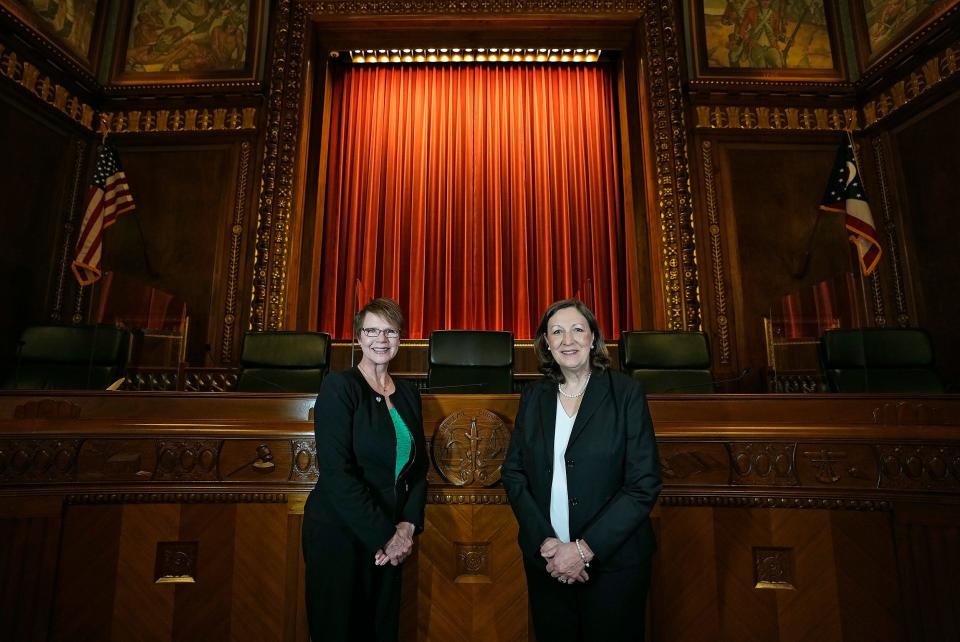Poll shows races, issues to watch ahead of Election Day

From abortion to the economy, Ohio voters have a lot on their minds this election season.
USA TODAY Network Ohio and the Suffolk University Political Research Center joined forces to gauge how Ohioans feel about candidates for several of the state's top political jobs and the issues defining the midterms.
Here's a look at what the poll of 500 likely voters found:
Ryan and Vance virtually tied for U.S. Senate seat
The race between U.S. Rep. Tim Ryan and J.D. Vance to replace retiring GOP Sen. Rob Portman is neck and neck, poll results show. The candidates are virtually tied in the polls, with the Democratic congressman maintaining a small lead at 46.6% of voters compared to 45.6% who planned to support Vance. Roughly 6% of voters were undecided.
More:Ryan, Vance nearly tied in U.S. Senate race
The result is within the poll’s margin of error, suggesting the office is still up for grabs at this point in the race. Vance and his Republican allies have recently ramped up spending to match Ryan, who has dominated the airwaves all summer with campaign ads in a race in which the GOP didn’t expect to have to play defense. The race could help determine which party controls the U.S. Senate, which is currently split between Democrats and Republicans.
DeWine leads Whaley for governor by almost 15 percent
Ohio Gov. Mike DeWine holds a commanding lead over Democratic challenger Nan Whaley, despite strong public opposition to his abortion restrictions. DeWine led Whaley in the poll by 53.8% to 39.2%. About 93% of Republicans, 12% of Democrats and 53% of independents backed DeWine. Whaley had support from 84% of Democrats, 4% of Republicans and 35% of independents.
More:DeWine maintains big lead over Whaley in governor race
Three in four likely Ohio voters cited abortion access as a deciding factor of their vote this election. That hasn’t necessarily translated into support for Whaley, though. 52% of likely voters had a favorable opinion of DeWine, including 45% of women, 75% of Republicans and 30% of Democrats. Meanwhile, 28% of likely voters don’t know who Whaley is and another 26% remain undecided about her. Everyone polled had heard of DeWine, who has been in politics for 46 years.

Ohioans overwhelmingly want candidates to debate
Public support for candidates to debate is overwhelming and spans across age, gender and political party, according to the poll. About 84% of likely Ohio voters said candidates for Ohio governor and U.S. Senate should debate each other. Only 10% said they should not debate.
More:Ohioans overwhelmingly want debates
Vance and Ryan are expected to debate, but the candidates have not agreed on a date and location. DeWine has all but said he won’t debate Whaley, who trails behind in polling, fundraising and name recognition.
DeWine has a long history of debating his Democratic competitors — including former Sen. John Glenn and ex-state Attorney General Rich Cordray. Earlier this year, however, he skipped debates with Republican challengers during the primary election, and in 2014 he refused to debate Democratic attorney general candidate David Pepper.
All three Ohio Supreme Court races too close to call
All three races for the Ohio Supreme Court are too close to call, but almost one in six likely voters are still undecided. In the race for chief justice, the poll showed Republican Justice Sharon Kennedy at 42.2% and Democratic Justice Jennifer Brunner at 41.8% — well within the poll's margin of error.
More:Supreme Court races are close
Republican Justice Pat DeWine leads 1st District Court of Appeals Judge Marilyn Zayas, a Democrat, by 43.4% to 41%. Justice Pat Fischer, a Republican, leads Democratic challenger and 10th District Court of Appeals Judge Terri Jamison, 42.2% to 40.6%.

Typically, Ohioans pay little attention to state Supreme Court races, but this year could be different for three reasons: candidates' party affiliations will be listed on ballots for the first time, current justices made high-profile redistricting decisions on Ohio legislative and congressional districts, and the U.S. Supreme Court overturning Americans' right to abortion could spark interest since the issue will likely end up before the Ohio Supreme Court.
Current Chief Justice Maureen O'Connor is leaving the court on Dec. 31 due to age restrictions. Gov. Mike DeWine will appoint a Republican to fill the seat left open when either Brunner or Kennedy becomes chief.
Many Ohioans have never heard of Larry Householder
Nearly 68% of poll respondents said state government in Ohio is somewhat corrupt, very corrupt or extremely corrupt, according to the poll. Only 5.6% said they don't think state government is corrupt at all.
But 45% of likely Ohio voters have never heard of Larry Householder, the former Ohio House speaker accused of passing a $1.3 billion bailout for two nuclear plants in northern Ohio in exchange for a political comeback and paying off personal expenses. Of those who have heard of him, only 4.4% have a positive opinion of him.
More:Larry who? Ohioans don't now man at center of investigation
Householder has largely stayed off the radar since his historic expulsion from the Ohio statehouse last June.If Householder is convicted in federal court, he faces up to 20 years in prison and a permanent ban from serving in the Ohio House.
Likely Ohio voters worried about the economy
Almost a third of likely Ohio voters are primarily concerned about inflation and its effect on the economy before any other issue, according to the poll. More than 53% of likely voters said economic conditions in the state are “fair,” as opposed to “good” or “excellent.” Another 23% of voters called conditions “poor," and more than 44% of voters said their standard of living is worse now than it was four years ago.
More:Ohio voters focused on inflation, economic issues
More than half of Ohioans blame President Joe Biden for the current state of the economy, according to the poll. Fifty-three percent of poll respondents said they disapprove of the job Biden is doing as president, including 94% of Republicans and 10% of Democrats. On the other hand, 55% of Ohioans said they approve of what DeWine has done as governor, including 73% of Republicans and 34% of Democrats.
Roughly one-fifth of likely voters cited "threats to democracy" as their top issue heading into the election, including 35% of Democrats, 11% of Republicans and 14% of independent voters. What those threats are, however, differ depending on who you talk to.
Most Ohioans oppose current six-week abortion ban
A substantial majority of Ohioans oppose the state's abortion law and want legal exceptions for rape victims and underage children. About 68% of likely Ohio voters said they oppose a ban on abortion after fetal cardiac activity is detected, usually around six weeks. 84% of voters supported exceptions to the ban for victims of rape or incest, and about 62% said they would support an exception for those under the age of consent — age 16 in Ohio.
More:Where do Ohio voters stand on abortion?
Ninety-one percent of Democrats opposed Ohio's current abortion law compared with 43% of Republicans and 73% of independents. About 21% of women said abortion was the most important issue compared to 5% of men. And it was the top issue for 18% of Democrats, 17% of independents and 7% of Republicans.
Two-thirds of likely Ohio voters would oppose the current law, but a poll taken in May showed an even split among Ohioans when it came to whether Roe v. Wade should be overturned.
Ohio's GOP-controlled Legislature is poised to pass a near-total abortion ban after the November election, and it's expected for the potential legislation to include exceptions to save the pregnant Ohioan's life but no exceptions for rape or incest. On Wednesday, a Hamilton County judge temporarily blocked the six-week ban for 14 days.
Nolan Simmons is a fellow in the E.W. Scripps School of Journalism's Statehouse News Bureau.
This article originally appeared on The Columbus Dispatch: USA TODAY Network Ohio/Suffolk University election poll


